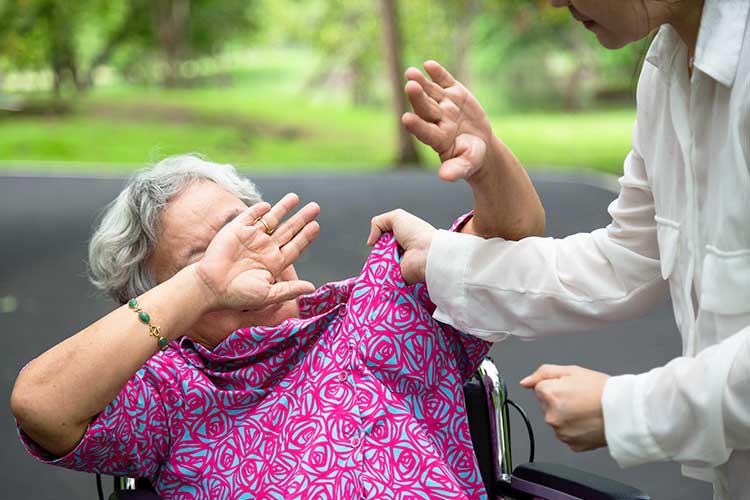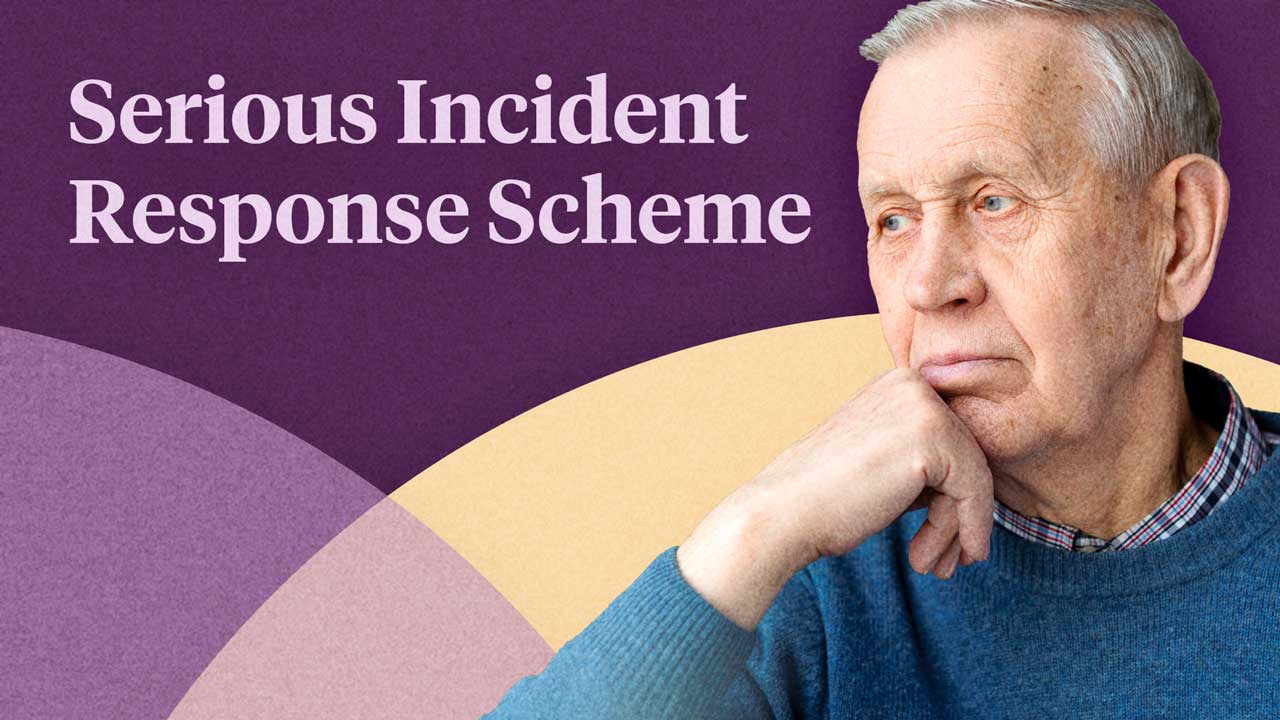January 2026: This module will be reviewed pending the release of the Aged Care Quality and Safety Commission’s updated SIRS guidance material, which Ausmed is actively monitoring.
All aged care consumers have the right to receive safe and high-quality care.
The Serious Incident Response Scheme (SIRS) is a federal government initiative that commenced in April 2021, aiming to reduce the risk and occurrence of abuse and neglect being perpetrated towards older Australians (ACQSC 2023).
The SIRS expands upon the protections to older adults in residential aged care offered by the Aged Care Act 1997.

What is the Serious Incident Response Scheme (SIRS)?
The SIRS was established based on recommendations from the Australian Law Reform Commission (ALRC). The ALRC proposed that reportable incidents should be expanded to include situations that are not specified in the Aged Care Act 1997 and that greater emphasis should be placed on investigating and responding to incidents rather than simply reporting their occurrence (DoH 2019).
Under the SIRS, Commonwealth funded aged care providers are required to:
- identify,
- record,
- manage,
- resolve and
- report
all serious incidents that threaten the safety, health, wellbeing and quality of life of their consumers, as well as take appropriate steps to prevent similar incidents from occurring again in the future. The SIRS also requires providers to put into practice an incident management system (ACQSC 2021a).
The SIRS aims to ensure that service providers deliver safe and effective care, and that consumers are adequately supported if an incident does occur. Through the implementation of an effective incident management system, providers should be able to respond to incidents more appropriately, provide consumers with access to support and continuously improve their services (ACQSC 2022a; DoH 2019).
The SIRS sits alongside the Aged Care Quality Standards, Charter of Aged Care Rights and Code of Conduct for Aged Care to ensure that service providers are held responsible for managing incidents that occur in their facilities (ACQSC 2022a).
Who Does the SIRS Apply to?
The SIRS covers all Commonwealth-subsidised aged care services delivered in residential care facilities and in the home, including those delivered through:
- Residential aged care providers
- Home Care Package providers
- The Commonwealth Home Support Programme (CHSP)
- Multi-Purpose Services (MPS)
- Short Term Restorative Care (STRC)
- The Transition Care Program (TCP)
- The National Aboriginal and Torres Strait Islander Flexible Aged Care Program (NATSIFACP).
(ACQSC 2022a)
What Are Serious Incidents Reportable Under the SIRS?

The Aged Care Quality and Safety Commission (ACQSC) defines a ‘serious’, reportable incident as an incident that:
- Actually occurred
- Is alleged to have occurred, or
- Is suspected to have occurred.
(ACQSC 2022b)
The incident must have affected a consumer and being perpetrated by either a:
- Staff member
- Family, friend or other visitor, or
- Another consumer (even if that consumer has a cognitive or mental impairment).
(ACQSC 2022b)
And the incident must have occurred in connection with the provision of residential care or home care (or flexible care provided in a residential setting) (ACQSC 2022b).
Any allegation, suspicion or witness account of the following will be required to be reported to the Aged Care Quality and Safety Commission:
| Serious Incident | Examples |
|---|---|
| Unreasonable use of force |
|
| Unlawful sexual contact or inappropriate sexual conduct |
|
| Psychological or emotional abuse |
|
| Stealing or financial coercion by a staff member |
|
| Neglect |
|
| Inappropriate use of restrictive practices |
|
| Unexplained absence from care / missing consumers |
|
| Unexpected death |
|
(ACQSC 2022b)
Note: for more in-depth information on each type of reportable incident, including differences between residential care and home care settings, see Ausmed’s Serious Incident Response Scheme (SIRS) Training Module.
The Serious Incident Response Scheme Under the Strengthened Aged Care Quality Standards
Standard 2: The Organisation - Outcome 2.5: Incident Management of the strengthened Aged Care Quality Standards (Action 2.5.1) requires aged care providers to implement an incident management system to document, investigate, address and manage incidents and near misses. The incident categories included in this system should align with the SIRS (ACQSC 2024).
Furthermore, Outcome 2.9: Human resource management (Action 2.9.6) requires aged care workers to undertake regular competency-based training on the requirements of the SIRS (ACQSC 2024).
Categorising Incidents
Under the SIRS, the period of time within which to notify a reportable incident to the Commission will depend on whether the incident meets the threshold of a priority 1 or priority 2 reportable incident.
Priority 1 Reportable Incidents
Priority 1 incidents must be reported to the Commission within 24 hours of the provider becoming aware of the incident.
Priority 1 incidents include:
- Incidents that cause (or could reasonably have been expected to cause) physical or psychological injury or discomfort to a consumer and require medical or psychological treatment
- Incidents where there are reasonable grounds to contact the police
- All incidents involving unexpected death, unexplained absence from care, or unlawful/inappropriate sexual conduct.
(ACQSC 2022b)
Priority 2 Reportable Incidents
Priority 2 incidents must be reported to the Commission within 30 days of the provider becoming aware of the incident (ACQSC 2022b).
They cover all reportable incidents that do not meet the criteria for Priority 1 (ACQSC 2022b).
Notifying the Commission
When a reportable incident occurs, a formal notification must be lodged with the Aged Care Quality and Safety Commission digitally via the My Aged Care service provider portal.
Depending on your organisation’s SIRS policy and incident management system, the person responsible for filing this form may change from provider to provider, however, all staff have a duty to recognise and report serious incidents as soon as they become aware of them.
A sample SIRS notification can be viewed at: https://www.agedcarequality.gov.au/sites/default/files/media/sirs-notification-example-response-unreasonable-force_0.pdf
SIRS guidance states that providers should encourage a culture of accountability and ensure that staff feel confident reporting incidents to the appropriate person.
Raising concerns about a serious incident directly with management is encouraged, however, any staff member is also able to raise a concern directly to the Commission.
Reportable Incidents Involving NDIS Participants
If a reportable incident causes harm to a participant of the National Disability Insurance Scheme (NDIS) or occurs during the provision of support or services by an NDIS provider, the provider is required to notify the Commission (ACQSC 2022b).
If a consumer who is both an aged care recipient and an NDIS participant is involved in a reportable incident under the SIRS, both the Aged Care Quality and Safety Commission and the NDIS Quality and Safeguards Commission must be notified (ACQSC 2022b).
Note that the definition of a reportable incident, as well as required reporting timeframes and required information to be reported may differ between the SIRS and then NDIS. More information about the NDIS requirements for reportable incidents can be viewed at: https://www.ndiscommission.gov.au/providers/registered-ndis-providers/reportable-incidents-0
Protections
There are also a number of ‘whistleblower’ protections afforded to those who report serious incidents under the Aged Care Act, that have been expanded with SIRS. These include:
- Protection from civil or criminal liability
- Qualified privilege in any defamation proceedings that arise
- Protection from liability to an action for defamation
- Protection from having a remedy (contractual or other) enforced against them
- Compensation for any detriments (actual or threatened) suffered due to disclosure.
(ACQSC 2022b)
However, in order to be protected under the SIRS, the following conditions must be met:
- The staff member discloses the incident to either: the provider, one of the provider’s key personnel, a staff member of the approved provider, a person who has been designated by the approved provider to receive incident reports, a police officer or the Aged Care Commission on Safety and Quality in Health Care
- The staff member provides their name before making the disclosure
- The person who has been disclosed to has ‘reasonable grounds’ to believe that a reportable incident has occured
- The disclosure is made in good faith, i.e. the information is relayed truthfully along with any relevant context and qualifications, and there is no prejudice or malicious intent motivating the disclosure.
(ACQSC 2022b)
If someone makes a report to you, it is your responsibility to protect the discloser’s identity (except from key personnel, the Commission or the police, or if revealing their identity is required by law).
For more information on the Serious Incident Response Scheme and any of the information mentioned in this article, visit: https://www.agedcarequality.gov.au/sirs.
Test Your Knowledge
Question 1 of 3
True or false: An incident perpetrated by a consumer against a visitor is reportable under the Serious Incident Response Scheme.
Topics
Further your knowledge
References
- Aged Care Quality and Safety Commission 2023, An Introduction to the SIRS, Australian Government, viewed 18 July 2023, https://www.agedcarequality.gov.au/sirs/introduction-sirs
- Aged Care Quality and Safety Commission 2024, Standard 2: The Organisation, Australian Government, viewed 17 April 2024, https://www.health.gov.au/resources/publications/strengthened-aged-care-quality-standards-august-2025?language=en
- Aged Care Quality and Safety Commission 2022a, Serious Incident Response Scheme, Australian Government, viewed 18 July 2023, https://www.agedcarequality.gov.au/consumers/serious-incident-response-scheme
- Aged Care Quality and Safety Commission 2022b, Serious Incident Response Scheme: Guidelines For Residential Aged Care Providers, Australian Government, viewed 18 July 2023, https://www.agedcarequality.gov.au/sites/default/files/media/SIRS-guidelines-for-residential-aged-care-providers.pdf
- Aged Care Quality and Safety Commission 2021, What is the SIRS?, Australian Government, viewed 18 July 2023, https://www.agedcarequality.gov.au/sites/default/files/media/what-is-the-sirs-provider-fact-sheet-august-2021.pdf
- Department of Health 2019, Serious Incident Response Scheme for Commonwealth-funded Residential Aged Care, Australian Government, viewed 18 July 2023, https://agedcare.royalcommission.gov.au/system/files/2020-06/RCD.9999.0174.0021.pdf
 New
New 

